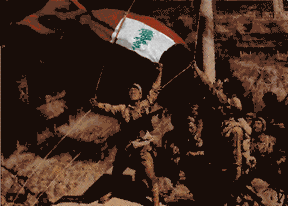 |
TODAY Monday 8 December 1997 Each weekday. Conn Nugent on what's new in the world, on the site. |
newsroom
 |
TODAY Monday 8 December 1997 Each weekday. Conn Nugent on what's new in the world, on the site. |
TODAY IN THE WORLD: "What I Wouldn't Give for This War to End."
On late Saturday, the day before the anniversary of the United States' entrance into the Second World War, I visited the Eisenhower Museum in Abilene, Kansas. The weather was cold and wet, and throughout my stay I saw no person other than a friendly elderly woman who collected the three dollars admission.
Most of the time I spent in the first few galleries, those that told of Eisenhower's pre-political life. He was descended from immigrants from the Rhineland. His father earned little, but the family had a passion for book learning and the social proprieties. They lived in a small white wood house, which remains on the grounds, more attractive and eloquent than the 1950s institutional structures that surround it. It was family finances that impelled Dwight Eisenhower to seek an appointment to the Class of 1915 at West Point.
He was an indifferent student and a maniacal football player, cut down by a knee injury. Under the real-life trial of the First World War, his intelligence and organizational talents quickly emerged and won him rapid advancement, though he never experienced combat. Nor would he. The commander of the largest armed force in the bloodiest conflict of all time saw no battle.
After the First World War, Ike was given a variety of commands, one of which influenced the course of environmental history. In the early 1920s, he commanded the first large-scale motorized troop deployment from the Atlantic to the Pacific. The roads were deplorable, and the young officer filed a strong report on the military vulnerability they imposed. Thirty years later Eisenhower proposed and won the establishment of the Interstate Highway System as a national security measure.
The World War II exhibits take up considerable space, of course, and you see Ike's uniforms, and his fountain pens, and drafts of his documents. He was a mediocre proclamationist but a marvelous memo writer. The lack of bombast induced his contemporaries to underestimate him, but at today's vantage the braggadocio of MacArthur and Patton and Montgomery seems almost silly, ill-suited to the implacable evil of their enemy. Eisenhower's final dispatch to George Marshall -- "The mission of this command was accomplished at three o'clock this morning" -- becomes great because of his sense of the ineffable gravity of the situation. He followed that dispatch with an order that German soldiers and civilians be compelled to view the corpses at the concentration camps, an act of anger that is particularly moving coming from a German-American.
One of the admirable qualities of the museum, as it was of Eisenhower himself, is its sympathetic depiction of the GI. There are photographs and statues of enlisted men, displays of letters they wrote home. The war as it was fought by those average men was brutal and horrific, and Ike knew that even as he waged it. His essential peaceableness may be his most arresting characteristic; it certainly befitted a citizen army.
Which was a point brought home the next day -- Pearl Harbor Day -- by a column which appeared in the Salina Journal. The column was written by Roy Livengood, a veteran of the North Africa and Italy campaigns. "I hope young lads out there who think war is a John Wayne adventure heed this column," he said, and quoted some of the letters he had sent back home in those days. He must have been an effective soldier, but he certainly didn't like it much. There are vivid complaints about filth, generals, boredom, and rats. Most of all, he loathed the carnage. "I hate this war...It's just about as rough and tough and brutal and evil as it can be and I hate it more than I've ever hated anything." Three weeks before the German surrender he wrote: "What I wouldn't give for this war to end. I've had a gut full of it, as has every man in my squad."
I'm not sure it's a such a bad thing that nobody was at the Eisenhower Museum on a rainy December day. This country has done well by its historical amnesia. My only worry is that those of us removed in time and space from the experience of combat will come to romanticize it, and to court it. We boomers, at least, will probably go to our graves never having faced such a huge test -- such a savage and crucial thing -- as was the Second World War. In the hundred years since William James called for the "moral equivalent of war," we have yet to find it. Nothing seems to excite many men (and increasing numbers of women) as the prospect of organized violence. War lures us, and at our peril. We may not be so lucky next time as to count on the services of a Dwight Eisenhower and a Roy Livengood.
Recent "Today" columns:
12/5: Feisty Euros at Kyoto
12/4: Beauty in the Bronx
12/3: God from Machine
12/2: Gentlemen's Bet
12/1: Public Opinion
11/26: Sperm
11/25: Sound Sound-Bite Science
11/24: Home Sweet Storage Locker
11/21: Tim Wirth's Inscrutable Adventure
11/20: Better to Receive than to Give
11/19: Wes Jackson's Problem with Agriculture
11/18: "Stay Home and Be Decent"
To access more "Today" columns, click "Archives" below.